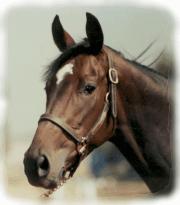A Horse, of Course with Don Blazer |
If you enjoy learning about horses, then you'll love our online courses. Each month you'll find a new column on our web site. We hope you'll enjoy it, and maybe e-mail us with questions or suggestions for other columns. A Horse, Of Course is a monthly column syndicated by Success Is Easy. If you like the column, call your local newspaper, or local horse publication and ask them to subscribe by contacting Success Is Easy. |
The Third Secret of Perfect Horsemanship Don Blazer copyright©2009 The nine secrets of perfect horsemanship are not about styles or disciplines. They are about finding perfection in a moment. In the training of horses, the actions you take are yours. The actions others take are their actions. To tell you "this is right" or "this is wrong" or that you "must do this" would be imprudent on my part. What anyone does is "right" for that person at that time in that place if they are open to the lesson. You have the power within to accomplish anything and if you follow your heart you will always know the right thing to do. This, however, does not mean you will always enjoy perfect days, blue skies, bright sunshine and smiling faces. No, your destiny is to experience everything so you will recognize perfection. To know joy, you must know sadness, to know winning, there must be losing. Peace is only possible if you know chaos and relief only comes after the pain. Mastering the third secret will change your life by changing the way you view and assess events. When you know the third secret you will experience events just as you do now; however, you will not react to events as you do now. At the moment of an event, we give the event a label, a name, a viewpoint. But if instead of labeling the event, you accept it simply as a message, learning comes more easily. If you ignore the message, you learn nothing and diminish the flow of your creative potential. Every event, every action also has a message for your horse, for all events with your horse are a training session. Your horse will study the event and learn from it and will not easily forget it. When you are new or inexperienced in training horses you have to do a lot of "wrong" things in order to learn to do the "right" things. Mistakes are part of the learning process. It is something to be accepted, but not labeled. There is only one rule to the training of horses which is followed by all good horsemen: Never knowingly place unnecessary stress to the muscle, skeletal or nervous system of the horse. The key word is "unnecessary." Stress to muscles, skeleton and nerves must occur for growth and strength and the mental development needed to reach perfection in performance. This single rule will guide you, and even though the stresses may not always be well-designed or well-implemented, they will never be damaging if they are done with the best interest of the horse in mind. However, if you are training from "ego" and not your heart, the stresses will almost always be "unnecessary." It is sometimes hard to understand how a physical discipline of the horse can be in the horse's best interest. Consider this: within the herd there are many physical disciplines enacted to stop unwanted or inappropriate behavior. Horses do not learn from praise alone, constant rewards eventually have no meaning and horses do not understand the concept of praise or rewards being withheld. The avoidance of the responsibilities of discipline and leadership (taking control of the herd) are the products of someone's ego seeking quick peer approval. Avoiding the responsibility is not an action of the heart. The heart is brave and accepts both the difficult and the easy. To find perfect horsemanship in every moment, we must accept the Third Secret: Practice non-judgment. It is not for you to judge whether any thought or action is wrong or right, is good or bad, is joyous or sad. Every event will produce emotions. The emotion must be recognized, experienced and accepted, but not judged. Each event simply "is." You must see it for that and nothing more. How other trainers train and how other riders ride are mirrors for you to see into yourself. Don't judge them; learn from them. Do not label, name or take a viewpoint about any event. View everything as simply an event from which to learn, the source of emotions to be experienced, a moment in the process of moving toward your perfection. Here are three guides to help you: 1. Think, act, move slowly and your horse will learn more quickly. 2. Set low goals so that all you do with your horse will be easy and successful. 3. Make no criticism of yourself or your horse; accept yourself and your horse without judgment. Don Blazer is the author of Nine Secrets of Perfect Horsemanship, a book he wrote for his granddaughter who won an AQHA World Championship in Youth Trail (2008). To read about the first two secrets, please visit the Archives Page. Visit A Horse, Of Course on the Internet at www.donblazer.com |
